Generational Attitudes in a New Nuclear Age

Millennials and Gen Z are less confident in the effectiveness and utility of nuclear weapons than Boomers and Gen X.
In the aftermath of Russia’s full-scale invasion of Ukraine in February 2022, President Joe Biden announced that US troops would not be sent to militarily support Ukraine in order to avoid a direct conflict with Russia and, potentially, a nuclear war. While some agree with this approach, others have criticized it, arguing that it communicates a message that countries possessing a substantial nuclear arsenal can deter the United States or, at the very least, compel it to act with greater restraint.
For older Americans, these events may have reminded them of memories from the Cold War. For younger Americans, the idea of a nuclear war has largely been a discussion in history class. To find out how younger Americans view the US nuclear arsenal and US nuclear policy, the Chicago Council on Global Affairs and the Carnegie Corporation of New York conducted a survey and found that most Americans—regardless of generation—are unfamiliar with issues at the forefront of nuclear weapons policy debates. But compared to older generations, younger Americans are less confident that nuclear weapons help to prevent conflicts and are more likely to say they don’t make a difference to national security.
Millennials and Gen Z are More Skeptical of Nuclear Weapons
When asked if they think nuclear weapons have been effective in preventing conflict between the United States and other countries, 62 percent of Americans say they are at least somewhat effective. Only a narrow majority of Millennials (52%) compared to more solid majorities of other generations agree (63% of Gen Z, 64% Gen X, 68% Boomer). However, the belief that nuclear weapons have been very effective in preventing conflicts declines consistently across the generations, with fewer than two in 10 Millennials (19%) and Gen Z (15%) saying they do.
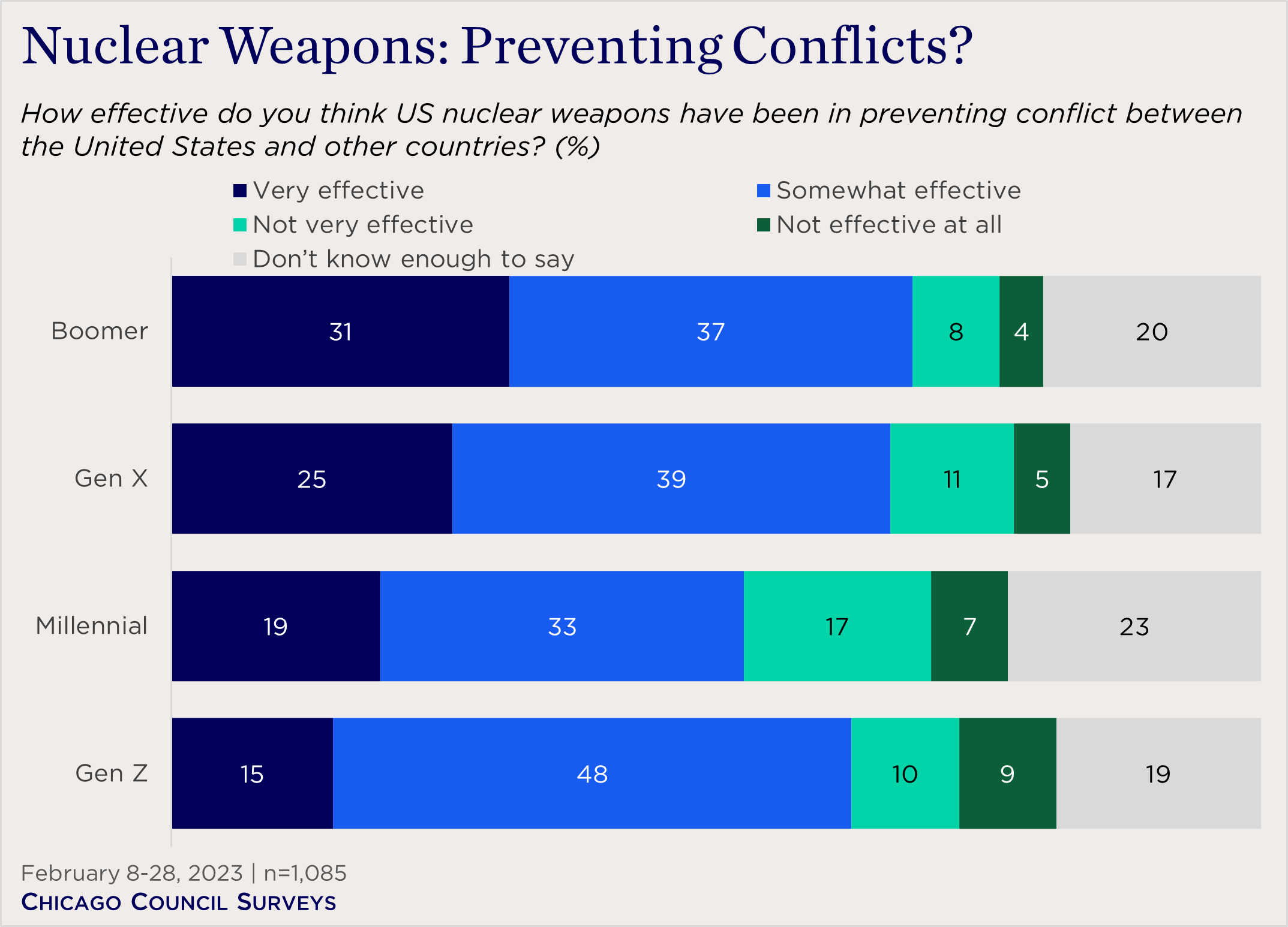
Millennials and Gen Z are also less likely than Boomers and Gen X to say that having nuclear weapons makes the United States safer.
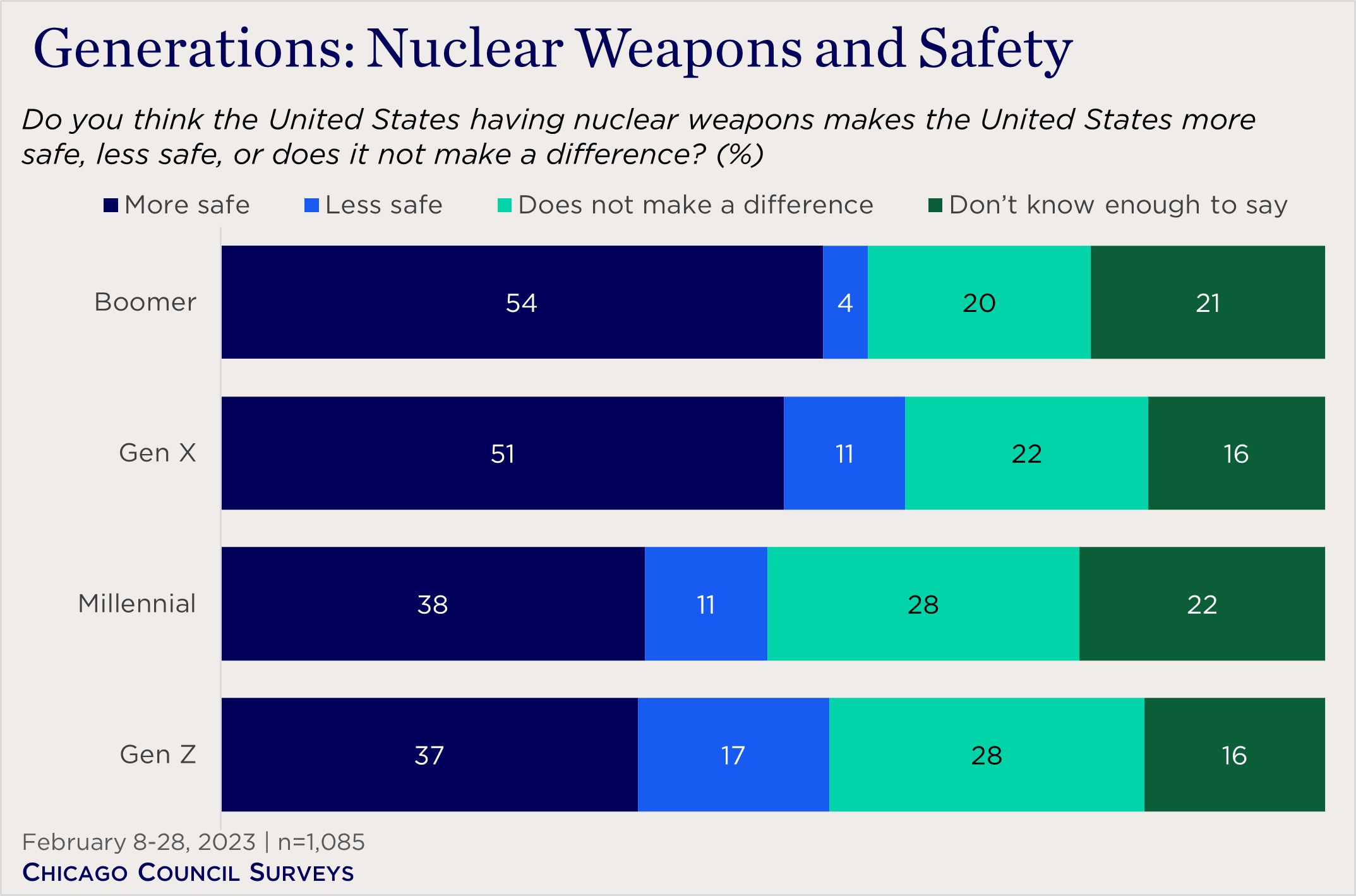
Americans of all Ages are Unsure about Nuclear Weapons
Despite the prominence of nuclear weapons in US foreign policy, a majority of Americans (58%) don’t think they know enough about nuclear weapons to assess the benefit or harm to them personally. That’s a view shared across generations, with similar proportions of Boomers (56%), Gen X (57%), Millennials (56%), and Gen Z (61%) all stating they don’t know enough about nuclear weapons.
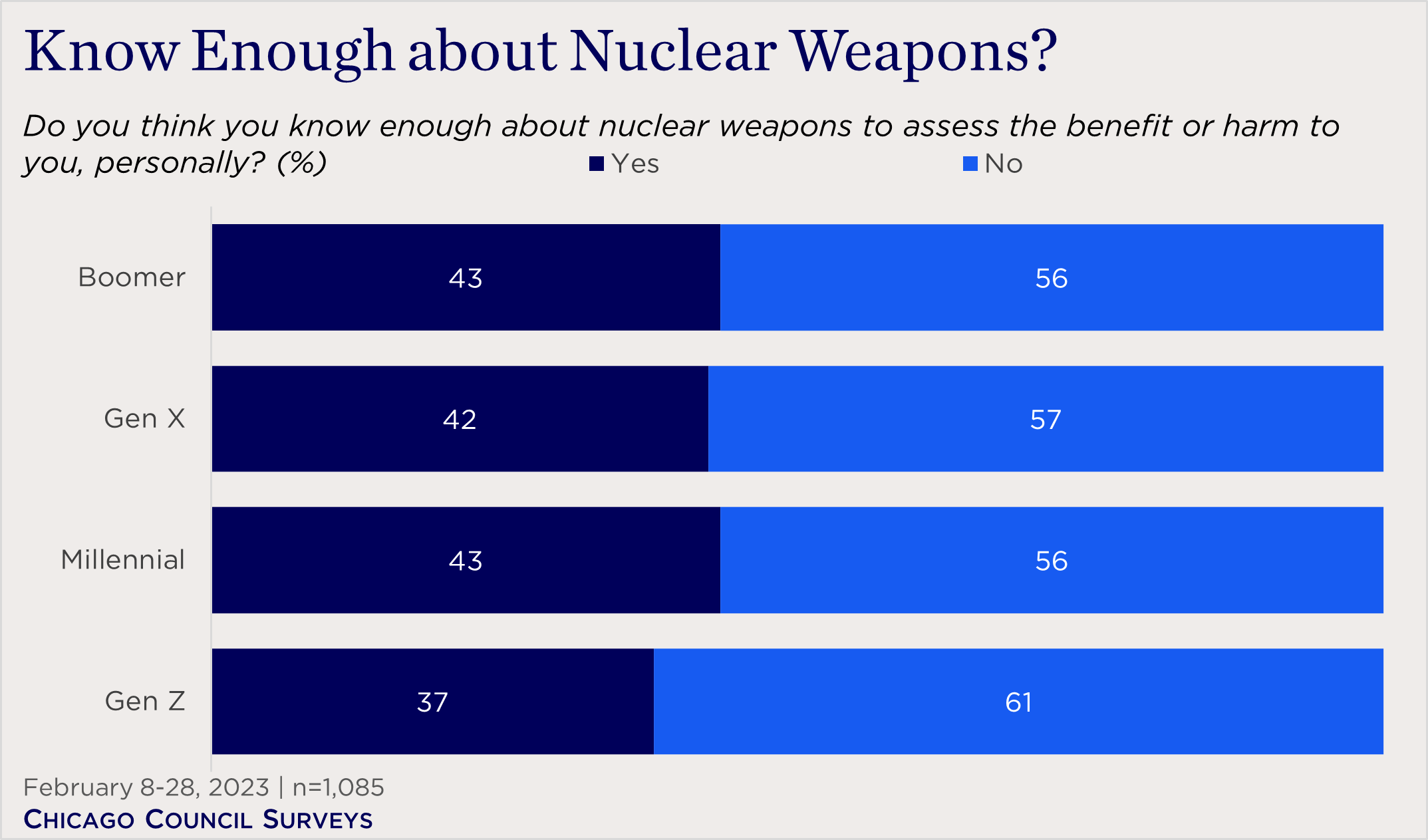
In addition, most Americans say they have not heard or read much or not at all about nuclear a variety of nuclear issues, including US nuclear weapons policy (69%), the cost of nuclear weapons (79%), targets of US nuclear weapons (68%), and the US missile defense system (68%). The extent of Americans’ familiarity with nuclear issues starts and stops at the effects of nuclear weapons when they are used. Across the board, each generation is as unfamiliar with nuclear issues as the other. Boomers are the most likely to be unfamiliar with the cost of nuclear weapons for the United States.
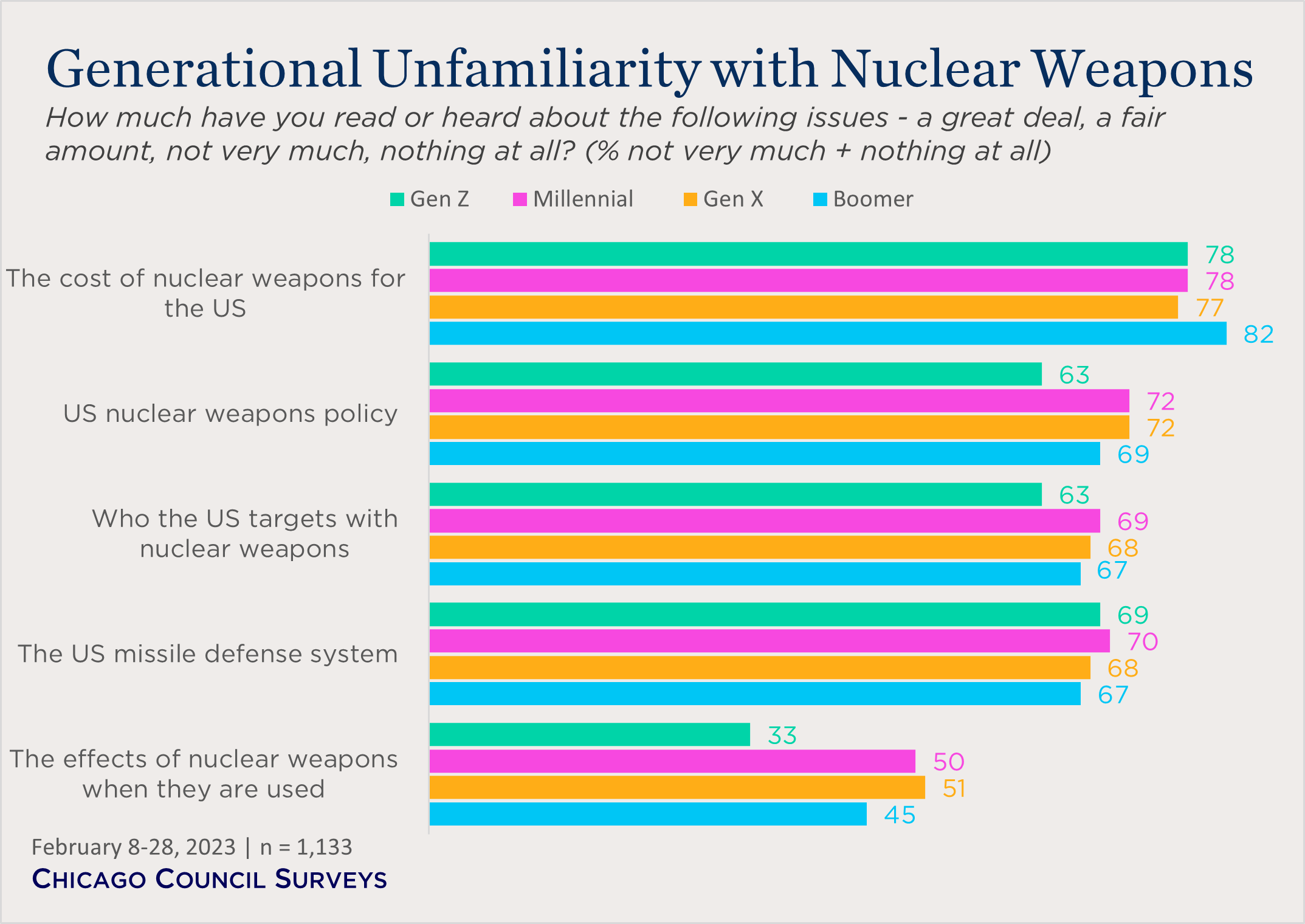
Generations are Split on Sources of Information on Nuclear Weapons
When asked about where they turn to the most for information on US nuclear weapons policy, roughly one-third (34%) of Americans say they don’t turn to any sources for that kind of information. Millennials (39%) and Gen Z (37%) are the most likely to say they don’t look for information about US nuclear weapons policy, while Boomers (30%) and Gen X (33%) are somewhat less likely to say so. This is consistent with findings that younger generations are less interested in following international affairs than older generations. Among those that do seek out nuclear policy information, television is a popular choice, especially among older Americans. The television is the most common source for Boomers (38%), Gen X (37%), and Millennials (19%), whereas only one in 10 Gen Z report turning to the television for nuclear news; this makes it the second-most common source for Gen Z after social media (16%). This is consistent with their lack of interest in following international affairs.
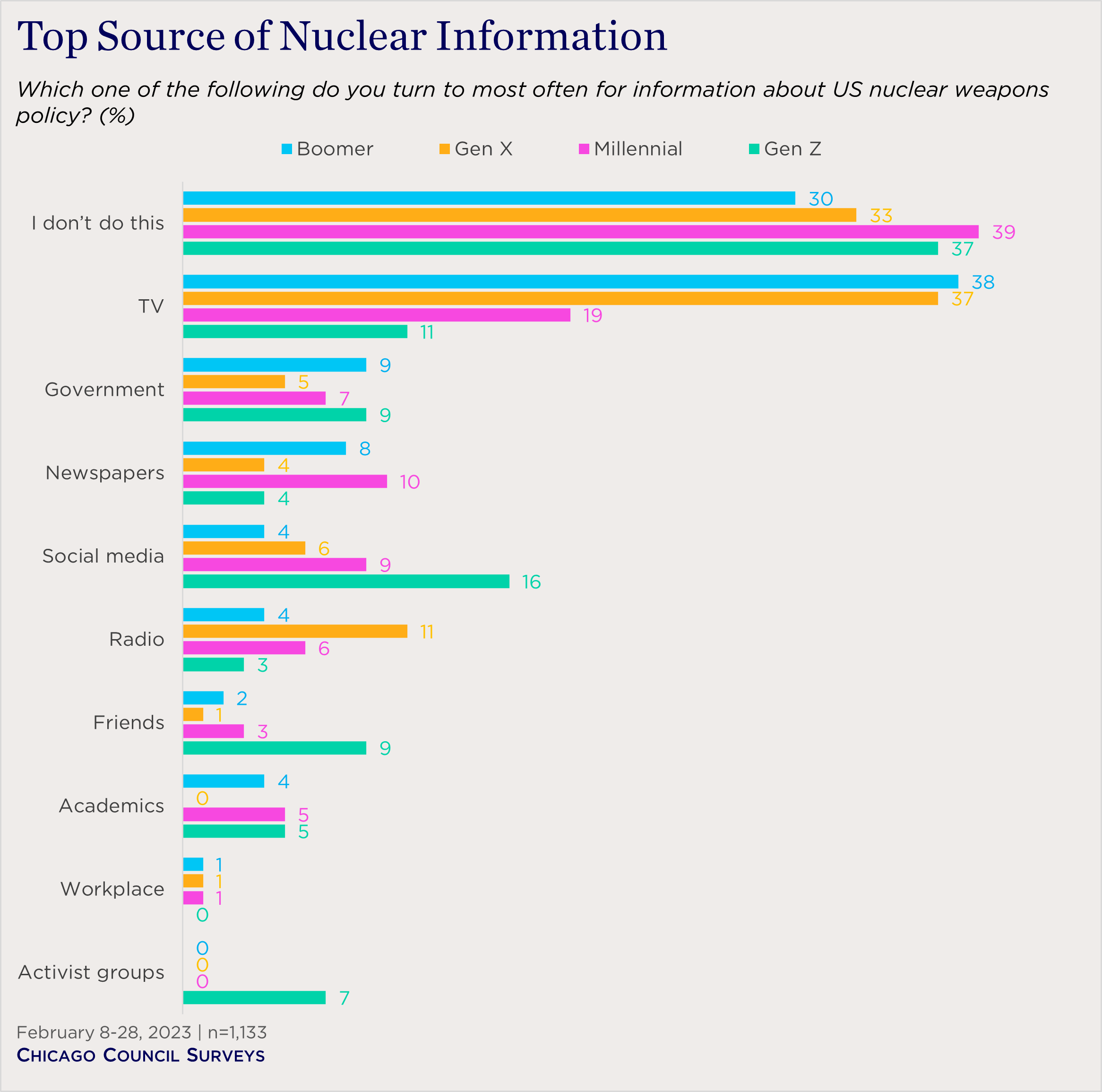
Though few Americans say they turn first to academics for information about US nuclear weapons policy, Americans trust the information they receive from academics (57%) more than any other person or group, including the president (43%) and Congress (37%). US military leaders come in a close second (56%), though Millennials and Gen Z are less trusting of them (51% and 46%, respectively) than Boomers and Gen X (59% and 61%, respectively). Gen Z is notably more trusting of information on nuclear weapons received from Congress (44%) and activist groups (29%) than older generations. Trust in social media is also 14 percentage points higher among younger generations than older generations, though only a minority of any generation trusts the information they receive from it.
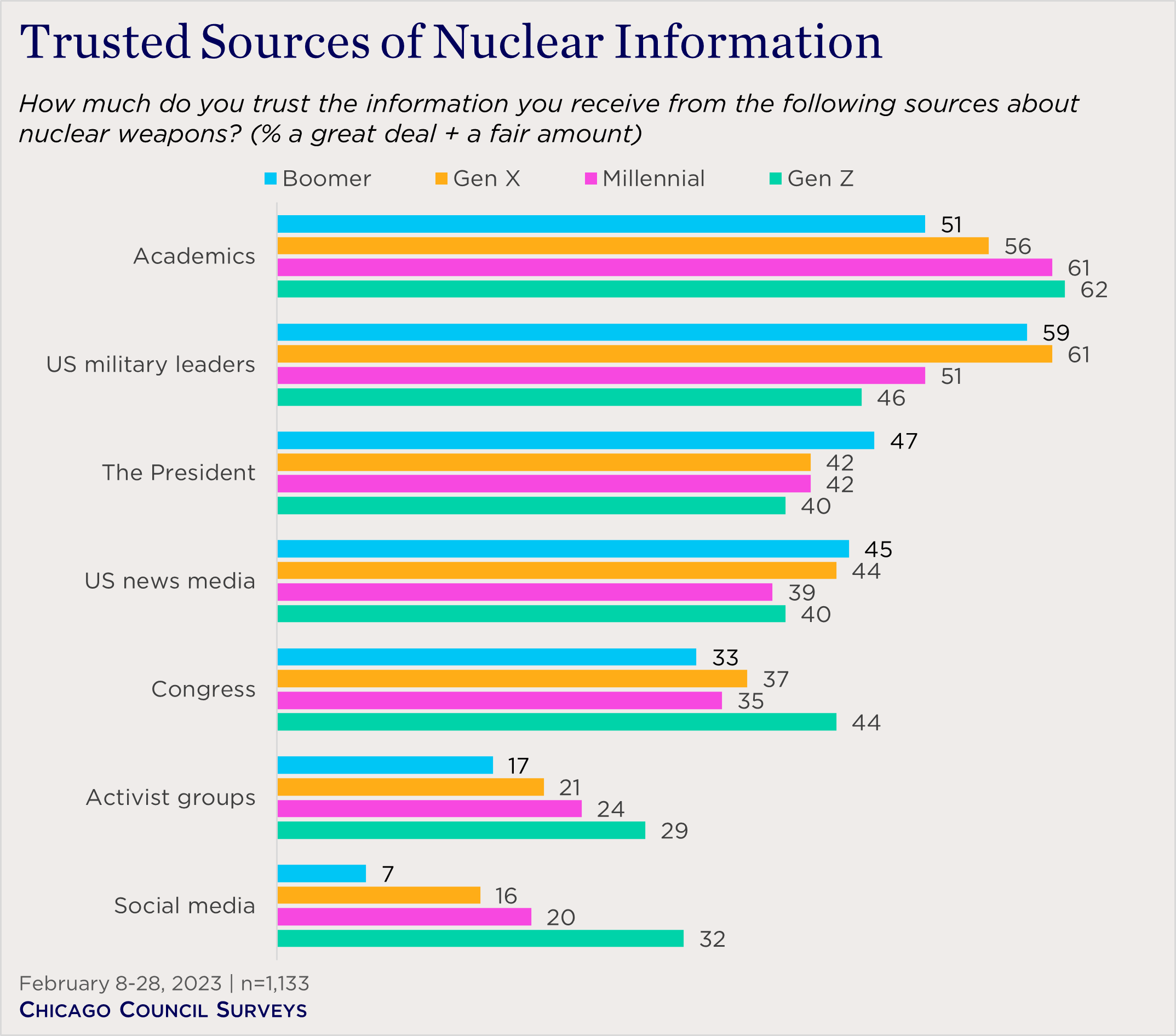
Conclusion
Perhaps because they have lived through a period in American history in which nuclear weapons were less of a prominent daily concern, young Americans seem to be less confident in the utility and efficacy of nuclear weapons than are older generations. At the same time, the world is entering a new nuclear age characterized by the expansion of nuclear weapons arsenals, renewed nuclear proliferation, and advancements in nuclear weaponry. Where will nuclear weapons fit in the defense policy of a country where an ever-growing portion of the voting population are unconvinced of their effectiveness and utility? Will US policies change to fit with younger generations’ views, or will Millennials and Gen Z learn to love the bomb?




Related Content
 US Foreign Policy
US Foreign Policy
While the public believes nuclear weapons are an effective tool in deterring aggression, less than half say they make the country more secure.
 US Foreign Policy
US Foreign Policy
Sixty-one percent of the US public is uneasy with only the president having the power to authorize the use of nuclear weapons.
 Public Opinion
Public Opinion
Dina Smeltz and Sharon Weiner unpack results from a recent Council-Carnegie Corporation of New York Survey.
